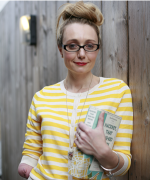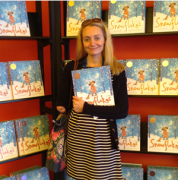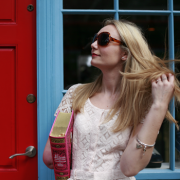Unforgettable Picture Books
There is a book which has stayed with me for years, a book whose text is written lightly across my heart in inky words the same colour as my memory. A book I’ve never read, but listened to again and again in a voice almost as familiar as my own: my mums. And now those words are part of me, like a chant which accompanies my earliest dreams.
But it’s not the words alone that are with me, it’s the pictures, the creation of a land beyond my own, as detailed and fierce as a young imagination. So distinct is this landscape that when I’m browsing bookshops, the moment my eyes glimpse the pale pink petals of a flower growing low on the ground, in a world of green and blue, it’s like a key back to my childhood, back to where the wild things are.
And that is why I believe picture books are the most important books of all; they stay with us forever and are the very first step on a journey toward a life with books. Each one has its own particular charm and read out loud together; the words (of a good picture book) can form a silvery thread that stitches the reader and listener together in a special story time bond.
Reading the books I had read to me, to my own daughter, the familiar imagery lets me skip back in time and reconnect with hope and fearlessness of being a child. And it’s lovely to watch as they awaken her imagination, let her learn new words and slowly begin to inspire her to want to learn to read.
I couldn’t read until I was eight, I couldn’t write anything that was in any way readable until I was ten. But that didn’t mean I didn’t have stories to tell, I just couldn’t make words flow from a pen. This is because I’m highly dyslexic.
I couldn’t decipher the shapes of letters so trying to understand the alphabet was like trying to read the symbols on a Chinese menu. None of them had any meaning and their individuality was unreachable.
But dyslexia doesn’t simply mean you’re failing, it’s more you’re viewing the world in a different way. Whilst without the right support it can trap you in the dark plains of illiteracy, the up side is that it gives you an amazing capacity to think outside the box. Because In truth you have no clear idea of what constitutes a box, so you can climb out and dance upon the lid.
Even though I was academically failing, my confidence wasn’t affected as I was too busy day dreaming about unicorns. I was lucky I had a supportive mum and an amazing headmistress who persevered in solving the riddle of my lack of learning. I was eight when my dyslexia was finally discovered and within three months I was able to read.
But books weren’t new to me, all the while in the background my mum had been reading to me. Where the wild things are, is the first book I remember along with the sounds of the birds outside my window and the shouts of other children, staying up later than me.
But there were others too, I spent nearly a whole spring asking slow crawling caterpillars if they would like to munch through a piece of cake. And long wet afternoons peering out the letterbox willing a tiger to come to tea. And as soon as my mum had put me to bed, I’d open the curtains and look through my pictures books whispering the words I’d remembered, retelling and re-living the stories.
When I was five my Grandmother read me Alice in wonderland, in which there were few drawings, just a few black and white sketches. I remember my Grandma’s room exactly. The picture of the women in the wide brimmed yellow hat, the jar of pink tablets that looked like smarties, the heaviness of the red and gold curtains, the flutter of moth wings against the lampshade and the pale seaside twilight that floated around the room.
And in that room somewhere between the pages, I became Alice. The jar of pink tablets grew a label saying ‘EAT ME.’ The mad hatter was adorned in a large yellow hat; the talking caterpillar nibbled the edge of his mushroom and spun a cocoon for a dark winged moth.
From then on pictures weren’t so important, I set the scene inside my head and in an Alicesqu way went wondering through the books my mum read me, until the words on the page were at last my friends.
Picture books were the start of a lifelong love affair with literature and like most authentic relationships, it had to start slowly. Because of their simplicity and exploratory nature, they’re the most accessible of all books. An adult who is not a confident reader can still share a picture book with their child. A child who can’t read at all can still enjoy the illustrations. They will possibly be the last books to survive as still pictures on a screen just don’t have the same meaning.
I have always wanted to write a picture book, because inside their pages anything is possible, they can ignite wonder and bring aspirations and beyond that they are maps that gently direct us to literacy. And I hope that Snowflakes, my first picture book and collaboration with illustrator Laura Ellen Anderson- will be the first of many.
—
Cerrie Burnell is an actress and well loved CBeebies presenter and one of the few visibly disabled presenters on television. She was named in the Observer’s top ten children’s presenters and the guardian’s 2011 list of 100 most inspirational women, where she received praise for tackling disability head on. Her original play Winged was performed in 2007 and her one women show The Magical Playroom is currently on tour, following a successful run at the Edinburgh Fringe.
Snowflakes is Cerrie’s debut book. Follow her on twitter @cerrieburnell
Category: Contemporary Women Writers, On Publishing, On Writing





























As a dyslexic, writer and lover of picture books, it was very heartening to read this. Good luck with Snowflakes Cerrie!
Your post brought back fond memories of the Dr. Seuss books of my childhood – first read to me by my Mom, then my older sister reading them to me, then me reading them to me…then dusting them off 20 years later and reading them to my nephews. I hope Snowflakes brings the love of books to a new generation of readers.
My son took a long while to read but he was always highly visual. When he looked back a few years later at Quentin Blake’s ‘Clown’ he was surprised to find it was a wordless picture book. He had ‘read’ it with me so often, but because words meant nothing to him then, he hadn’t even noticed that the story I told him each time was drawn only from the pictures, not from an author’s words. He would also read picture books to his little sister when he was still unable to read because he read the pictures. The best picture books work on so many different levels, with words, without words, words and pictures together or apart.
Hello Kelly
Thank you so much for your comments and thank you for reading my work. Dyslexia can be a wonderful thing-difficult- but brilliant still. I don’t know the dog picture book but I’ll be sure to look it up.
Cerrie xx
Cerrie, if you’re in London on October 15th, come to the launch of my first published picture book: “…and Nobody Noticed the Mouse”, at The Children’s bookshop, Muswell Hill, between 6-8pm.
I would love to come- if I can make it -beautiful title, sounds lovely X
Hi Cerrie
As a mother of three young children, we have spent countless hours watching you on TV. I loved reading your article and so interesting to hear about your coping mechanisms before dyslexia was diagnosed. It sounds like it made you even more imaginative and resourceful. Will definitely look up your book some time (though living in Kenya at the moment so not sure how easy it will be to get here..but when I’m back in the UK will do!) Best wishes, Rebecca
Thank you so much for your comments and how exciting to be living in Kenya! Let me now how you get on with the book and if your really struggling I can send you a copy.
Big thanks
Cerrie x
This is a lovely story, beautifully told with wonderful language. Thank you for sharing. I especially like “In truth you have no clear idea of what constitutes a box, so you can climb out and dance upon the lid”. What a great picture that conjures up, the ability to free the imagination and be creative. I think we all need to take up dancing on the lid from time to time!
Hello Nora
Thank you for your comments and so glad you enjoyed reading it. Yes dancing on the lid is definitely something we need more of!
Cerrie x
Cerrie, as a mother of a dyslexic, wife of a dyslexic, and an avid, passionate reader and lover of picture books, I applaud the wonderful stories you’re telling! Iv’e never forgotten the pleasure of so many pictures books – one that comes to mind easily, “Go Dog, Go!” It’s a dog party!! Thanks for your beautiful article! Best of luck with your great project!